- Home
- Diane Gaston
A Pregnant Courtesan for the Rake Page 6
A Pregnant Courtesan for the Rake Read online
Page 6
Very occasionally they offered billiard tournaments, the prize of which was some debauched spree, but most of the time this room was for their own amusement. Oliver preferred it that way. Increasingly he was preferring the days Vitium et Virtus was closed and he had time to himself.
He, Frederick, Jacob and Nicholas began the club back in their Oxford days. It was secret, exclusive and naughtier than the Hell Fire clubs of their grandfathers. Vitium et Virtus also lacked the Hell Fire clubs’ anti-religious affectations. No black mass for Vitium et Virtus. No devil worship or paganism or ridiculous rituals. Their club worshipped pleasure and excess, in card-playing, drink and fornication. It had been their highest accomplishment at the University.
When they left Oxford, they brought the club to London.
What did Oliver care that he was not welcome at Almack’s? He belonged to Vitium et Virtus.
Life had been good right up until that night six years ago when Nicholas disappeared, leaving only a pool of blood and his signet ring in the alley behind the club.
Oliver, Frederick and Jacob had kept Vitium et Virtus running for Nicholas’s sake, but for how much longer? Frederick and Jacob were now married. What honourable gentleman runs a club of Dionysian revels when his wife is waiting at home?
Oliver would keep it going by himself, if necessary. To him, giving up on Vitium et Virtus was like giving up on Nicholas. He refused to believe Nicholas was dead.
He finished his brandy and poured another.
Enough blue devils.
‘I do have one new idea for the club,’ he began.
Jacob grinned. ‘Nothing that involves driving hooks through one’s skin and hanging from ropes.’
Oliver had told them of the self-mutilation and flagellation of some Paris clubs.
‘Not unless you wish to try it,’ he shot back.
Jacob held up both hands. ‘Not me!’
‘We could have a Vitium et Virtus ball.’
‘Oh, that is original,’ Frederick said.
‘Not the usual sort of ball.’ Oliver rose and picked up one of the billiard balls from a pocket. ‘We have two baskets of balls like these, only each ball has a number painted on it. There are matching numbers for men and for women. The men pick from the men’s basket and the women from the women’s. Then they partner up with the person whose number matches theirs. No one knows ahead of time who their partner will be.’
Frederick straightened his spine. ‘Georgiana and I will not play.’
Jacob laughed. ‘Nor will Rose and I.’
Oliver shook his head. ‘Of course not.’ In truth, he also had no desire to play that game. ‘I think several of our members will relish it, though. We know many married couples who would clamour to be first in line to play.’
Frederick turned back to his game. ‘You manage it, if you like, but you had better make certain everyone knows what to expect.’
‘What if Bowles shows up?’ Jacob asked.
Frederick missed his shot.
Nash Bowles was a nasty fellow they’d known since their Oxford days, who’d joined before they’d become more selective. He’d lately pressed to purchase Jacob’s share of the club.
Frederick’s lips thinned. ‘That reprobate.’
Bowles was the reason Fred had married his Georgiana. Vitium et Virtus had held a virgin auction which was supposed to have been a total farce. The women usually auctioning their wares were certainly no virgins, but instead, those who loved the sexual excess of the club. Instead, respectable, well-bred Georgiana Knight, a viscount’s daughter, had climbed up on the table and offered herself. Frederick had bid on her, intending to protect her reputation.
‘Bowles.’ Fred spat out the name like a piece of rancid meat. ‘He had better behave himself or he will answer to me.’
Bowles had threatened to ruin Georgiana for her escapade at Vitium et Virtus unless she married him as her father wished.
Honourable Frederick married Georgiana instead, to rescue her from Bowles. And somehow Fred and Georgiana had fallen in love with each other.
What were the chances that marriage would remain blissful? Especially since Georgiana was so free-spirited.
And how long would Jacob remain besotted with Rose? He was a duke and she had been a maid here at Vitium et Virtus. How long before Jacob left Rose like Oliver’s father had left his mother?
‘You two should go home to your wives,’ Oliver said. His friends had better do right by those good women or they’d have to answer to him.
‘I was thinking the same thing,’ Fred said.
Jacob looked pensive. ‘I was thinking how lucky I am to have this happiness. And how much I wish Nicholas could share in it.’
‘Nick.’ Oliver’s voice rasped with pain.
He placed his hand palm up on the billiard table. Jacob and Frederick placed theirs on his. ‘In Vitium et Virtus,’ they recited together.
They’d been schoolboys when they first contrived this oath, resurrecting it after the night Nick vanished to remind them that they were still four. Nicholas was somewhere, Oliver insisted. And somehow he’d find his way back to them.
They broke apart, and Frederick poured more brandy. He lifted his glass in a toast. ‘To absent friends.’
Oliver and Jacob raised their glasses.
‘Be he in heaven or hell—’ Oliver continued, a refrain they’d repeated several times in the six years Nicholas had been gone.
‘Or somewhere in between—’ Fred added.
‘Know that we wish you well.’ Jake ended it.
If only words could magically bring Nick back.
They downed their brandy in silence.
* * *
After Oliver said goodbye to his friends, he made his way to the back door, the private entrance used only by him and his friends. The drizzle persisted, so he dashed across the garden and out the gate, through the alley and the garden of the town house on Bury Street adjacent to the club. Oliver’s town house. How lucky he’d been to be wealthy enough to buy a town house so conveniently located to Vitium et Virtus.
When his father became the Marquess of Amberford and inherited the property and riches to go with the title, he’d settled the fortune he’d acquired in India on Oliver, a fortune great enough that Oliver could live more than comfortably. He could afford many pleasures. Fast carriages, matched horses, beautiful women.
Funny that Oliver used to fear he’d be poor. When he was a boy, his father’s wife often threatened to put Oliver out on the streets. Eventually he learned about his fortune and that she could not touch it. When his father was not present, she was always nasty to Oliver. He’d absolutely believed he could be tossed out onto the streets like Cecilia’s street urchins—
Cecilia.
Again she popped into his mind unbidden. For the last three months the memory of her caught him at odd moments. Why should she inhabit his thoughts so often? He’d only known her one day.
Perhaps the brevity of their time together had enhanced the experience, made it grander, magical. It had seemed as if she’d appeared out of the mist and disappeared as quickly. No liaison of his had ever begun so unexpectedly and ended so abruptly.
He reached the garden door of his town house and went inside, brushing the raindrops off his coat and hair. He greeted his cook and housekeeper as he passed the kitchen and made his way up to the hall where his butler stopped him.
‘Sir, you have a caller,’ the butler said.
‘A caller?’ Oliver rarely had callers. He was not on society’s circuit of people whose favour one must court.
His butler, only a decade older than he, leaned closer. ‘A lady. She declined to give her name.’
Oliver’s brows rose. ‘You do not know her?’
Irwin typically had an excellent ey
e for faces and names, especially ladies’ names.
He shook his head. ‘She has been waiting over an hour.’
‘An hour?’ What lady would wait an hour for him? ‘Why did you not simply say I was out?’
Irwin appeared affronted. ‘I did say you were out. She insisted upon waiting.’
Oliver was always very careful that the ladies with whom he associated knew precisely the nature of the relationship. He did not want any of them to consider him so important they’d waste an hour waiting for him.
Irwin inclined his head towards the drawing room. ‘She waits in there.’
Oliver shrugged. He might as well discover who it was.
He opened the door, startling the woman who sat upon the sofa facing the fireplace. She stood and turned to him.
For a moment Oliver could not breathe.
‘Cecilia.’
Chapter Six
Cecilia had forgotten how his presence affected her. His handsome face. His masculine grace. His riveting eyes. Unwillingly, her body flared in response to him. She’d not wished to seek him out, but what other choice did she have?
He hurried towards her. ‘But why are you here? How did you know—?’
‘Where to find you?’ She finished his question and felt somewhat embarrassed to admit to the answer. ‘I took one of your cards before I left. It gave your direction.’
She was wary of him, of how he would respond to her, of his reaction to what she must tell him.
To her surprise, he softened his voice. ‘I am delighted to see you, Cecilia. What is wrong? You seem distressed. Do you need my assistance?’
She had to turn away from him. From his kindness.
‘I never intended to come to you. I went first to my parents—my mother—’ Her voice cracked and she blinked away tears. The last thing she wanted was to weep in front of him. She wrestled her emotions back in control. ‘My mother and father refused to see me. I am dead to them, you see.’
She’d yearned for her mother. When everything fell so completely apart in Paris, she’d desperately yearned for her mother. She’d wanted to be enfolded in her mother’s arms and soothed and told everything would turn out all right. So many times after Duncan had beaten her she’d wished for her mother’s arms, but when Duncan was alive, it had been impossible. This time, though, with Duncan dead, she thought perhaps her parents would forgive her. She’d travelled first to their country house only to be told they were in London.
She then went to London, but they refused to see her.
You are dead to them, their butler, a man she’d known since childhood, had frostily told her.
So she came here. To Oliver.
She’d always known that her ruse as Madame Coquette would end some day. One night the man who’d paid for time did not fall for her excuses. He’d tried to take what he wanted. For a few frightening moments, it was as if her husband had returned from the dead to again force himself on her. Hercule had burst in and stopped him.
The club manager had not been amused. When he learned what really transpired with Madame Coquette, the manager gave her an ultimatum. Provide what the men desired or leave.
Give the manager control over her? No man would control her ever again. Although a part of her despaired, she’d told the manager she would leave. She begged Vincent to look after the street urchins, sold her meagre belongings and her beloved quilt, and journeyed back to England to a mother who refused to see her.
Now her money was rapidly running out. Now she was forced to put herself at the mercy of another man.
Oliver.
‘Tell me how I may help,’ he said without hesitation.
She faced him again. ‘I need money.’
‘Money.’ His voice turned cautious. ‘Am I to know why you need money?’
She took a deep breath and pressed her hand to her abdomen. ‘I am going to have a child.’ She fixed her gaze on him. ‘Your child. And I do not have funds enough to take care of the baby.’
He looked stunned—and not pleased.
‘A baby.’ His eyes flashed. His entire demeanour changed. ‘You said you would take precautions.’
She lifted her chin. ‘I did take precautions.’
‘This cannot be!’ He began to pace. ‘Are you certain?’
‘Am I certain?’ she shot back. ‘Am I certain I took precautions? Yes. Very certain. Am I certain I am with child? Yes.’
So much for kindness from Oliver, apparently. Well, she had endured disappointment before. Kind, loving Duncan had turned violent towards her as soon as life became difficult. Why expect Oliver to be different?
She’d thought nothing could hurt as much as being turned away by her parents. Nothing could make her feel so totally alone, so desolate, but now she realised just how acutely she’d hoped Oliver would not fail her. She’d hoped he’d be that man he’d been for one day and night in Paris.
She should have known he would not. How could he be glad she was carrying his child?
‘Heed me, Oliver.’ She directed her gaze at him. ‘I did not want this to happen any more than you did. I tried to prevent it, but my efforts failed.’
He rubbed his face as he prowled back and forth. ‘Are you certain I am the father?’
Cecilia felt her face grow hot. What man would not use this excuse to avoid his duty? ‘Yes. You are the baby’s father.’
Although, it made sense he would expect her to be with other men. She’d fallen into bed with him after only a day, had she not?
‘Am I to believe you?’ he said in an ill-tempered voice. ‘One night. Three months ago?’
‘I thought this consequence extremely unlikely. I’d never conceived with my husband.’ Even when she had not taken precautions. But this time she’d missed her courses and could no longer deny why her stomach felt so unsettled in the morning. ‘It took time for me to realise it was true.’
‘Did you see a doctor?’ he asked as if trying to prove she was lying.
‘I did. He confirmed it.’ The doctor’s examination had been quite unpleasant.
Oliver turned away from her. He faced the fireplace and put a hand on the mantel as if holding back strong emotions. As if his efforts to contain his rage were fraying.
How many times had she witnessed Duncan in such a state?
She should have stayed in Paris, but how could she raise a child there? What work could she do besides what the club manager required of her? Even if she could endure such an occupation, could she bear raising her child in a maison close?
Vincent and the other girls at the club told her to visit a physician who would make the problem go away. That idea was worse than becoming a fille de rue.
Instead, she’d gone running to her mother. Surely a mother would help her daughter in such a fix. She’d devised a plan. She’d tell her parents the child was Duncan’s, pretend he’d been killed three months ago instead of three years. She could preserve her respectability that way. She’d figured it all out, except she had not anticipated her mother would send her away.
Would consider her dead.
Likely Oliver wished she were dead as well.
She fingered the pearl she still wore around her neck. ‘You once told me you are wealthy. If you are wealthy, you can support this child you helped create.’
He continued to face the mantel. ‘You say you are with child. You say the child is mine. You say you want money for it.’
‘Yes.’ Although want was the wrong word; need was more accurate. ‘I will be penniless in a few days.’
She touched the pearl again, her only piece of jewellery. What once was a remembrance of a lovely day would have to be sold.
‘You say.’ He said it in a voice filled with scorn and disbelief.
She knew that tone of voice
. Duncan had used that tone of voice. Scorn quickly led to rage.
She’d made the right choice when she’d left Oliver that night in Paris. Their day together had been delightful, their lovemaking glorious, but never would she risk being the recipient of a man’s rage ever again.
She’d risk one more try. ‘I do not need anything else from you. Merely enough money to support the child. Make an arrangement to provide me the money and I will never plague you again.’
Oliver was whirling with this news, with seeing Cecilia again. She looked so beautiful in a deep green dress that complemented her pale skin and dark hair. Her hair was primly tucked into a bonnet, but he remembered how glorious it had been that night in Paris, cascading over her shoulders in dark silken curls. He remembered how her naked skin had gleamed in the candlelight. How often she’d appeared in his dreams, looking much like that. How often he’d wished to see her again.
Here she was.
With news he never wanted to hear.
A child.
He’d vowed never to bring a bastard child into the world. No child of his would endure the name-calling and rejection he’d lived through. No child of his would be torn between two worlds.
He’d always been so careful, only bedding women who knew the rules of their sensual game, who did not want a baby any more than he did.
He could not think; his emotions were too high.
In his mind he heard the voices of his friends—Frederick, Jacob, Nicholas—cautioning him. Saying to him, ‘How do you know it is your child? How do you know there even is a child? Do nothing,’ they’d say, ‘until you know whether or not she is lying. You only knew her for a day, after all.’ A day was no time at all.
His father, too, would say to assume a woman lies. Certainly Oliver’s stepmother lied at any opportunity, without any qualms. From her, Oliver knew first-hand how duplicitous a woman could be.

 The Lord's Highland Temptation (HQR Historical)
The Lord's Highland Temptation (HQR Historical) The Liberation of Miss Finch
The Liberation of Miss Finch The Lord's Highland Temptation
The Lord's Highland Temptation Shipwrecked with the Captain
Shipwrecked with the Captain Her Gallant Captain at Waterloo
Her Gallant Captain at Waterloo Chivalrous Captain, Rebel Mistress
Chivalrous Captain, Rebel Mistress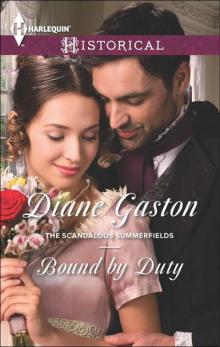 Bound by Duty
Bound by Duty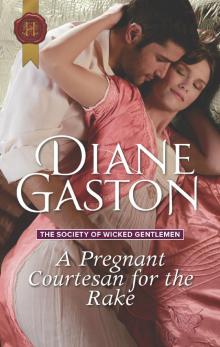 A Pregnant Courtesan for the Rake
A Pregnant Courtesan for the Rake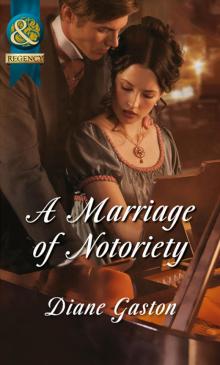 A Marriage of Notoriety
A Marriage of Notoriety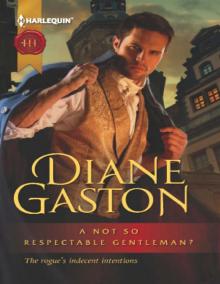 A Not So Respectable Gentleman?
A Not So Respectable Gentleman? Valiant Soldier, Beautiful Enemy
Valiant Soldier, Beautiful Enemy A Reputation for Notoriety
A Reputation for Notoriety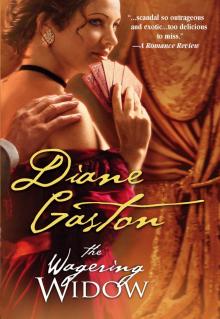 The Wagering Widow
The Wagering Widow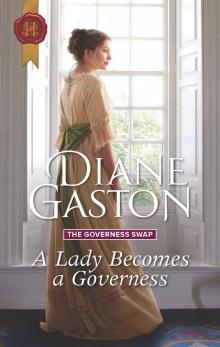 A Lady Becomes a Governess
A Lady Becomes a Governess Regency Wagers
Regency Wagers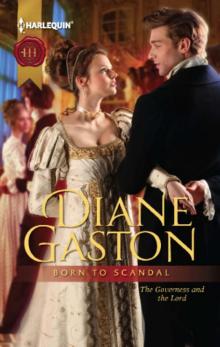 Born to Scandal
Born to Scandal Bound by Their Secret Passion
Bound by Their Secret Passion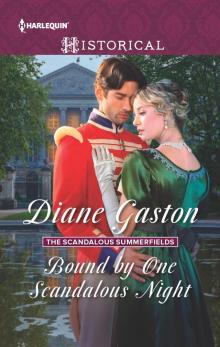 Bound by One Scandalous Night
Bound by One Scandalous Night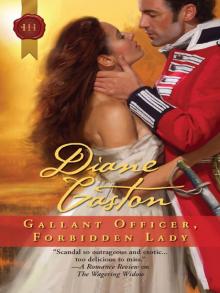 Gallant Officer, Forbidden Lady
Gallant Officer, Forbidden Lady Bound by a Scandalous Secret (The Scandalous Summerfields)
Bound by a Scandalous Secret (The Scandalous Summerfields)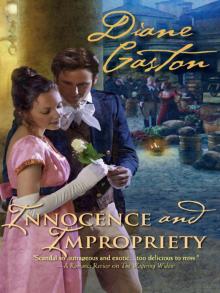 Innocence and Impropriety
Innocence and Impropriety